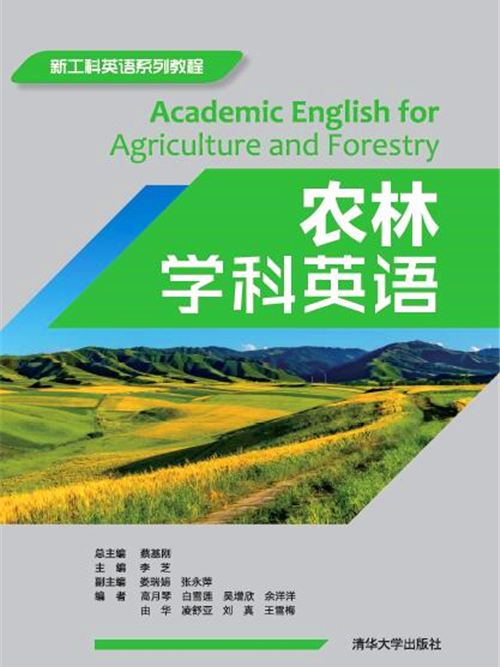內容簡介
本教材定位為農林類學科通用學術英語。選材兼顧學術性和趣味性,每個單元包括與農林學科相關的三篇閱讀文章,內容和話題具有較高的相關性。第一篇為概述、背景介紹類文章;第二篇為本單元話題涉及的相關問題、熱點話題類文章;第三篇為與最新技術或未來展望相關的文章。三篇文章之後為辭彙、學術閱讀、學術寫作以及聽力練習。本教材既適用於農林類高等院校老師課堂教學和學生課下學習,也適用於從事農林相關行業工作的科技人員進行自學。
圖書目錄
Part A Texts / 02
01 Unit 1
Passage 1 What Is a Forest? / 02
Forestry
Passage 2 Global Forest Resources Assessment / 04 Passage 3 Challenges and Opportunities for Forests / 05 Part B Vocabulary / 09 Part C Academic Reading Skills / 10 Skimming and Scanning / 10 Part D Academic Writing Skills / 13 Writing Topic Sentences / 13 Part E Academic Listening Skills / 15 Listening for Main Ideas and Note-taking / 15 Part F Integrated Exercises / 18
III
Part A Texts / 26
25 Unit 2
Passage 1 What Is Urban Agriculture? / 26
Urban Agriculture
Passage 2 Food Price Volatility and the Urban Poor / 27 Passage 3 Agronomic Considerations for Urban Agriculture in Southern Cities / 29 Part B Vocabulary / 33 Part C Academic Reading Skills / 34 Generalization-specification / 34 Part D Academic Writing Skills / 37 Classification and Citation / 37 Part E Academic Listening Skills / 42 Understanding Main Ideas and Supporting Evidence / 42 Part F Integrated Exercises / 46
Part A Texts / 54
53 Unit 3
Passage 1 What Is Biodiversity? / 54
Biodiversity
Passage 2 The Loss of Diversity: Causes and Consequences / 56 Passage 3 A To-Do List for the World’s Parks / 59 Part B Vocabulary / 62 Part C Academic Reading Skills / 63 Main Ideas and Supporting Details / 63 Part D Academic Writing Skills / 65 Cause and Effect / 65 Part E Academic Listening Skills / 68 Recognizing Cause and Effect Relationship / 68 Part F Integrated Exercises / 70
Part A Texts / 78
77 Unit 4
Passage 1 Carbon Sequestration / 78
Ecosystem
Passage 2 The Ecological Footprint / 80 Passage 3 Signs of Hope for Nature in a Rapidly Degrading World / 83 Part B Vocabulary / 85 Part C Academic Reading Skills / 86 Interpretation of Visual Information / 86 Part D Academic Writing Skills / 89 Description of Process / 89 Part E Academic Listening Skills / 92
Recognizing the Language for Introducing Process, Tendency or Change / 92 Part F Integrated Exercises / 94
Part A Texts / 102
101 Unit 5
Passage 1 Landscape Architecture / 102
Landscape Architecture
Passage 2 Green Infrastructure / 103 Passage 3 Sponge City: Solutions for China’s Thirsty and Flooded Cities / 106 Part B Vocabulary / 109 Part C Academic Reading Skills / 111 Problem and Solution / 111 Part D Academic Writing Skills / 113 Definition / 113 Part E Academic Listening Skills / 115 Recognizing Definitions and Key Facts in a Lecture / 115 Part F Integrated Exercises / 118
Part A Texts / 126
125 Unit 6
Passage 1 Desertification / 126
Soil and Water
Passage 2 Measures to Combat Desertification: Lessons Learned
and Best Practices / 127 Passage 3 Exploring Nature-Based Solutions for Source Water Protection on World Water Day / 130 Part B Vocabulary / 132 Part C Academic Reading Skills / 134 Recognizing the Difference Between Facts and Opinions / 134 Part D Academic Writing Skills / 137 Identifying Key Points Related to Perspective and Stance / 137 Part E Academic Listening Skills / 140 Recognizing Similar/Different Opinions in an Interview/Lecture / 140 Part F Integrated Exercises / 143
Part A Texts / 150
149 Unit 7
Passage 1 Food Safety and Food Contamination / 150
Food Safety
Passage 2 Are G.M.O. Foods Safe? / 152 Passage 3 Digital Transformation of the Food System / 154 Part B Vocabulary / 157 Part C Academic Reading Skills / 158 Recognizing Comparison and Contrast / 158 Part D Academic Writing Skills / 161 Writing Evaluative Language: Opinion, Attitude and Assumption / 161 Part E Academic Listening Skills / 165 Recognizing the Language for Introducing Evaluation / 165 Part F Integrated Exercises / 169
Part A Texts / 176
175 Unit 8
Passage 1 Food and Forests: We Can Have Them Both / 176
Forestry Products
Passage 2 How Can Restoration Help Solve Hunger? / 177 Passage 3 Forest Pathways to Sustainable Development / 179 Part B Vocabulary / 182 Part C Academic Reading Skills / 183 Arguments and Supporting Evidence / 183 Part D Academic Writing Skills / 186 Writing Arguments and Types of Supporting Evidence / 186 Part E Academic Listening Skills / 188
Recognizing How Evidence Is Presented to Support an Argument / 188 Part F Integrated Exercises / 192

